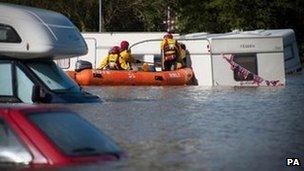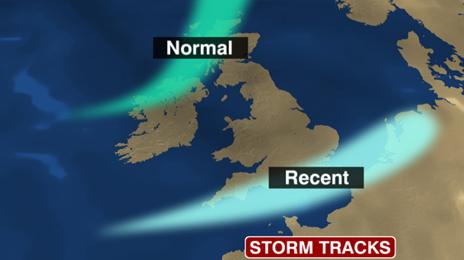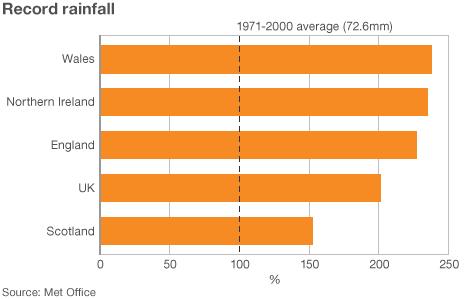Why has our weather been so wet?
- Published

Heavy rain in June caused serious flooding in areas such as here in Aberystwyth
Why has our weather been so wet? It's a simple enough question to ask, but more complicated to answer.
We have had the wettest April, the soggiest June and the wettest April to June period on record. And - if that doesn't depress you enough - there is no prolonged settled weather pattern on the horizon.
Essentially, the main culprit is the six-mile high jet stream - a fast wind blowing around the planet that makes and moves our surface pressure systems. It's been stuck in a rut recently - and that's why we've been experiencing so much rain.
An accelerating jet stream causes air to rise upwards through the atmosphere and creates low pressure centres - and a greater likelihood of rain - on the Earth's surface.
It is powered by temperature contrasts between the cold polar regions of the planet and the hot tropics. The heatwave currently over the US has pushed the jet stream further north than is usual.
How the jet stream has changed

That's caused an unusually large area of high pressure over Greenland, and this has in turn pushed a north-westerly part of the jet stream over the UK.
So for the past three months, Britain has found itself underneath an accelerating part of the jet stream, meaning low pressure has dominated the weather, causing record-breaking rain.
Torrential rain
But are there any changes expected to this weather pattern? Not at least for a fortnight - and probably longer - with low pressures continually forming over the British Isles.
At times like these I would expect these low pressure systems to interact with warm, humid air from the continent bringing an ongoing risk of torrential rain and localised flooding.
Normally we would wait for an ex-hurricane to move into the mid-Atlantic, bringing a surge of warm air northwards to knock the jet stream out of its rut.
But we are forecasting a quieter season than normal, with no Atlantic hurricanes on the way. And that means we may be stuck with this weather pattern for a while yet.
Perhaps we should cross our fingers that August will bring a change of fortunes.

*New figures are compared with the 1971-2000 rainfall average, which was 72.6mm
- Published2 July 2012
- Published29 June 2012
- Published22 June 2012